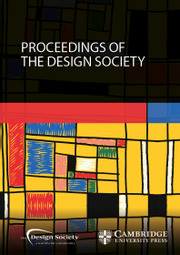No CrossRef data available.
Article contents
Characterising the low-tech approach through a value-driven model
Published online by Cambridge University Press: 16 May 2024
Abstract
In this article, we argue that the low-tech narrative redefined by a French low-tech movement in recent years can be considered as a legitimate research object for design research. Based on the French low-tech movement's literature, we present the definitions of the low-tech concept as an approach driven by principles and highlight two theorical limitations of this type of definition. Based on a value-sensitive design approach, we present transdisciplinary research results through a value-driven low-tech model and discussed its limitations and possible use as a tool for engineers.
- Type
- Industrial Design
- Information
- Creative Commons
- This is an Open Access article, distributed under the terms of the Creative Commons Attribution-NonCommercial-NoDerivatives licence (http://creativecommons.org/licenses/by-nc-nd/4.0/), which permits non-commercial re-use, distribution, and reproduction in any medium, provided the original work is unaltered and is properly cited. The written permission of Cambridge University Press must be obtained for commercial re-use or in order to create a derivative work.
- Copyright
- The Author(s), 2024.




